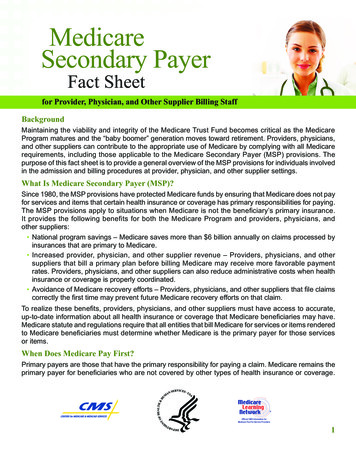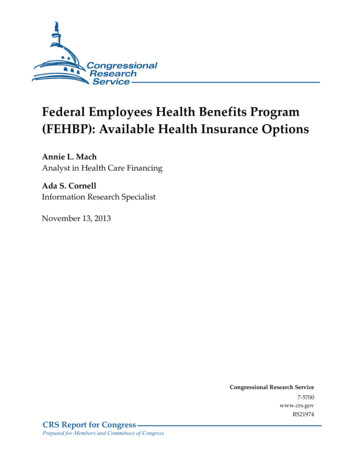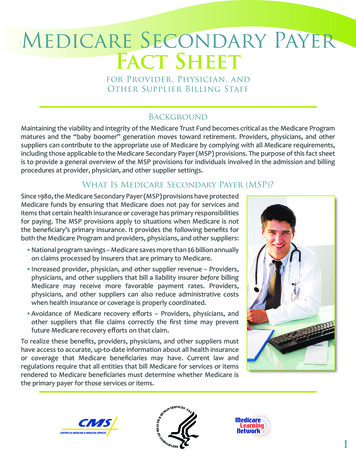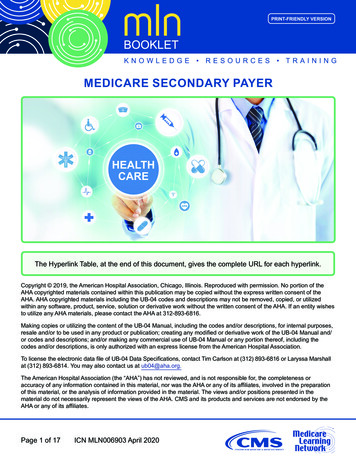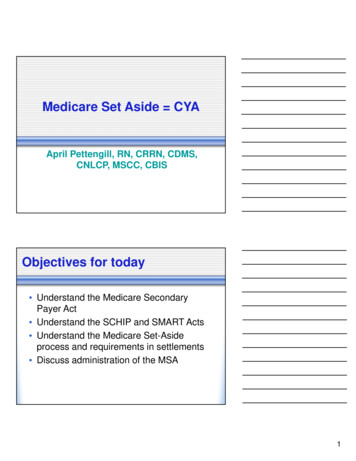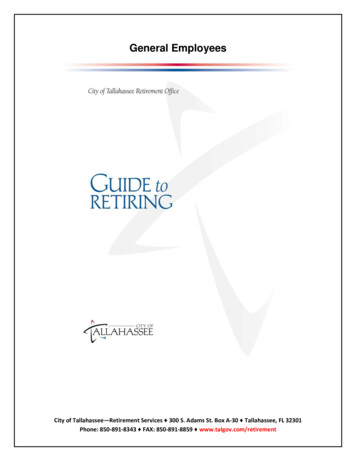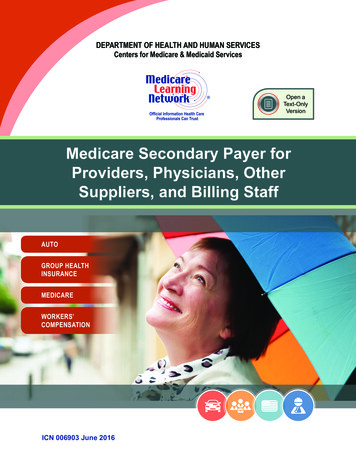
Transcription
DEPARTMENT OF HEALTH AND HUMAN SERVICESCenters for Medicare & Medicaid ServicesOpen aText-OnlyVersionMedicare Secondary Payer forProviders, Physicians, OtherSuppliers, and Billing StaffAUTOGROUP HEALTHINSURANCEMEDICAREWORKERS’COMPENSATIONICN 006903 June 2016
Table of ContentsWhat Is MSP? . 3When Does Medicare Pay First? . 3Are There Exceptions to the MSP Provisions? . 7What Happens if the Primary Payer Denies a Claim? . 7When May Medicare Make a Conditional Payment? . 8How Is Beneficiary Health Insurance or Coverage InformationCollected and Coordinated?. 9What Are Your Responsibilities under the MSP Provisions? . 11How Do You Gather Accurate MSP Data from the Beneficiary? . 12What Happens if You Submit a Claim to Your MAC withoutProviding the Other Insurer’s Information? . 13What Happens if You Fail to File Correct and Accurate Claims?. 13Who Do You Contact with MSP Questions? . 14Resources . 15The American Hospital Association (the “AHA”) has not reviewed, and is not responsible for, thecompleteness or accuracy of any information contained in this material, nor was the AHA or any of itsaffiliates, involved in the preparation of this material, or the analysis of information provided in the material.The views and/or positions presented in the material do not necessarily represent the views of the AHA.CMS and its products and services are not endorsed by the AHA or any of its affiliates.2
The Medicare Secondary Payer (MSP) provisions protectthe Medicare Trust Fund. Compliance with the MSPprovisions contributes to the appropriate use of Medicarefunds. This publication provides a general overview ofthe MSP provisions and outlines your responsibilities.When “you” is used in this publication, we are referringto providers, physicians, other suppliers, and billing staff,unless stated otherwise.Stay Up to DateTo sign up for automatic updates,select the “Subscription Sign-upfor COB&R Overview Web PageUpdate Notification” link onthe Coordination of Benefits &Recovery Overview webpage. Please note: The informationin this publication applies onlyto the Medicare Fee-For ServiceProgram (also known asOriginal Medicare).Table 4. Hyperlink Table, at theend of this document, provides thecomplete URL for each hyperlink.What Is MSP?The MSP provisions protect the Medicare Trust Fund byensuring Medicare does not pay for items and services whenother health insurance coverage is primary to Medicare. TheMSP provisions apply to situations where Medicare is notthe primary or first payer of claims. In these cases, the MSPrequirements provide the following benefits for you and theMedicare Program:National program savings – The Centers for Medicare & Medicaid Services (CMS)enforcement of the MSP provisions saved the Medicare Program roughly 8.5 billion in Fiscal Year (FY) 2015.Increased provider, physician, and other supplier revenue – If you bill aprimary plan before billing Medicare, you may get more favorable reimbursementrates. Also, properly coordinated health coverage may expedite the paymentprocess and reduce your administrative costs.Avoidance of Medicare recovery efforts – If you file claims correctly the firsttime, you prevent future Medicare recovery efforts on claims.To get these benefits, you must access accurate, up-to-date information about yourMedicare beneficiary’s health insurance coverage. Medicare regulations require anyonesubmitting Medicare claims to determine whether Medicare is the primary payer foritems or services provided to the beneficiary.When Does Medicare Pay First?Primary payers have first responsibility to pay a claim first.Medicare pays first for beneficiaries in the absence of otherprimary insurance or coverage. Medicare may also payfirst when the beneficiary has other insurance coveragebut a special condition exists. Table 1 lists some commonsituations where a beneficiary has both Medicare andother health plan coverage and lists which entity pays first(primary payer) and pays second (secondary payer).3Definition of “Spouse”“Spouse,” under the MSP WorkingAged provisions, includes bothsame-sex and opposite-sexmarriages. Find more informationin MLN Matters Article MM8875about the definition of spouse.
Table 1. Analysis of Common MSP Coverage SituationsIndividualConditionIs age 65 or older,and covered by aGroup Health Plan(GHP) throughcurrent employmentor spouse’s currentemploymentThe individual isentitled to MedicareIs age 65 or older,and covered by aGHP through currentemployment orspouse’s currentemploymentThe individual isentitled to MedicareIs age 65 or older,has an employerretirement GHP, andis not workingThe employerhas less than20 employeesThe employer has20 or more employees,or the employer is partof a multi-employergroup with at least oneemployer employing20 or more individualsPays FirstPays SecondMedicareGHPGHPMedicareMedicareRetiree CoverageMedicareGHPGHPMedicareThe individual isentitled to MedicareIs under age 65,disabled, andcovered by a GHPthrough his or hercurrent employmentor through a familymember’s currentemploymentThe individual isentitled to MedicareIs under age 65,disabled, andcovered by a GHPthrough his or hercurrent employmentor through a familymember’s currentemploymentThe individual isentitled to MedicareThe employerhas less than100 employeesThe employer has 100or more employees, orthe employer is part ofa multi-employer groupwith at least oneemployer employing100 or more individuals4
Table 1. Analysis of Common MSP Coverage Situations (cont.)IndividualConditionHas End-Stage RenalDisease (ESRD)and GHP coveragewas the primary planprior to the individualbecoming eligible andentitled to Medicarebased on ESRDFirst 30 months ofMedicare eligibilityor entitlementHas ESRD andGHP coverageAfter 30 months ofMedicare eligibilityor entitlementHas ESRD andConsolidatedOmnibus BudgetReconciliation Actof 1985 (COBRA)coverage prior tobecoming eligible orentitled to MedicareFirst 30 months ofMedicare eligibilityor entitlementHas ESRD andCOBRA coverageAfter 30 months ofMedicare eligibilityor entitlementIs coveredunder Workers’Compensation (WC)because of ajob-related illnessor injuryThe individual isentitled to MedicarePays FirstPays OBRAWC for health careitems or servicesrelated to job-relatedillness or injuryWorkers’Compensation* See section titled,“When May MedicareMake a ConditionalPayment?”5Medicare
Table 1. Analysis of Common MSP Coverage Situations (cont.)IndividualWas in an accident orother situation whereno-fault or liabilityinsurance is involvedConditionPays FirstThe individual isentitled to Medicare1) No-fault or liabilityinsurance for accidentor other situationrelated health careservices claimedor releasedAccidentMedicare* See section titled,“When May MedicareMake a ConditionalPayment?”Note: For ORM,Medicare does notmake a paymentuntil ORM fundsare exhausted2) WC, Liability, orNo-Fault where ongoingresponsibility formedicals (ORM) isreported. Medicare doesnot make a paymentIs age 65 or olderor is disabled andcovered by Medicareand COBRAPays SecondThe individual isentitled to MedicareMedicareCOBRANOTE: For more instances of how Medicare works with other government payers,take the Medicare Learning Network (MLN) Web-Based Training Course“Medicare Secondary Payer Provisions.”6
Are There Exceptions to the MSP Provisions?There are no exceptions to the MSP provisions. Federal law takes precedence overState laws and private contracts. Even if an entity believes it is the secondary payer toMedicare due to State law or the contents of its insurance policy, the MSP provisionsapply when billing for services.What Happens if the Primary Payer Denies a Claim?In the following situations, Medicare may make payment, assuming the service is aMedicare-covered and payable service and the provider files a proper claim: A no-fault or liability insurer does not pay during the “paid promptly” period ordenies the medical billA WC program does not pay during the “paid promptly” period or denies payment(for example, where WC excludes a particular medical condition)Workers’ Compensation Medicare Set-Aside Arrangement (WCMSA) or theORM benefits terminate or exhaustA GHP denies payment for services because:The beneficiary exhausted plan benefits for particular servicesThe beneficiary is not entitled to benefits under the GHPThe beneficiary needs services not covered by the GHPWhen submitting a claim to Medicare in these situations, you should includeinformation showing why the other payer denied the claim, made an exhausted benefitsdetermination, or did both.7
When May Medicare Make a Conditional Payment?Frequently, there is a long delay between an injury and the decision by the primarypayer in a contested compensation case. Medicare may make conditional payments toavoid imposing a financial hardship on you and the beneficiary while awaiting a decisionin a contested case.Medicare can make conditional payments on behalf of beneficiaries for Medicarecovered services even if it is not the primary payer. Medicare may make conditionalpayments for covered services in liability (including self-insurance), no-fault, and WCsituations if both the following are true: Liability (including self-insurance), no-fault, or WC insurer is responsible for paymentThe claim is not expected to be paid promptlyNOTE: Medicare has the right to recover any conditional payments. The BenefitsCoordination & Recovery Center (BCRC) recovers conditional paymentswhen the Medicare beneficiary receives a settlement, judgment, award, orother payment.If there is a primary GHP and the provider does not bill the GHP first, Medicare maynot pay conditionally on the liability (including self-insurance), no-fault, or WC claim.Providers must bill the GHP before billing Medicare, and the primary payer paymentinformation that appears on all primary payer remittance advices must appear on theclaim submitted to Medicare.Medicare will not make conditional payments associated with WCMSAs and/or wherethere is ORM.8
“Paid Promptly” DefinitionFor no-fault insurance and WC claims, “paid promptly” means payment within 120 daysafter the no-fault insurance or WC carrier received the claim for specific items and/orservices. Without contradicting information, the date of service for specific itemsand services must be treated as the claim date when determining the “paid promptly”period. Furthermore, regarding inpatient services, without contradicting information,the date of discharge must be treated as the date of service when determining the“paid promptly” period.For liability insurance (including self-insurance), “paid promptly” means payment within120 days after whichever of the following occurs first: The date a general liability claim is filed with an insurer or a lien is filed against apotential liability settlementThe date the service was furnished or, in the case of inpatient services, the dateof dischargeFor more information on conditional payments, refer to the following sections of theMedicare Secondary Payer Manual: Chapter 1, Section 10.7Chapter 3, Sections 30 and 40Chapter 5, Section 40Chapter 6, Sections 40.3 and 60All Non-Group Health Plan (NGHP) claims must first be sent to the liability insurance(including self-insurance), no-fault insurance, or a WC insurer. Refer to MLN Matters Article MM7355 for instructions on submitting a claim for conditional payment.Ongoing Responsibility for Medicals (ORM)Pursuant to Section 1862(b)(2)(A)(ii) of the Social Security Act (42 U.S.C. 1395y(b)(2)(A)(ii)), Medicare is precluded from making payment where payment “has been made,or can reasonably be expected to be made ” under liability insurance (includingself-insurance), no-fault insurance, or a WC law or plan, hereafter, referred to asNGHP. Where ORM has been reported, the primary plan has assumed responsibilityto pay, on an ongoing basis, for certain medical care related to the NGHP claim.Consequently, Medicare is not permitted to make payment for such associated claimsabsent documentation that the ORM has terminated or is otherwise exhausted. AllNGHP claims must first go to the liability insurance (including self-insurance), no-faultinsurance, or a WC insurer.How Is Beneficiary Health Insurance or Coverage InformationCollected and Coordinated?Coordination of Benefits (COB) allows plans that provide coverage for a person withMedicare to determine their respective payment responsibilities. The BCRC collects,manages, and reports other insurance coverage for Medicare beneficiaries. Providers,physicians, and other suppliers must collect accurate MSP beneficiary informationfor the BCRC to coordinate the information.9
COBA ProgramThe COB Agreement (COBA)program establishes a nationalstandard contract between theBCRC and other health insuranceorganizations for transmittingenrollee eligibility data andMedicare-paid claims data. Thismeans Medigap plans, Part Dplans, employer supplementalplans, and others rely on a nationalrepository of information withunique identifiers to receiveMedicare-paid claims data forthe purpose of calculating theirsecondary payment. The COBAdata exchange processes includeprescription drug coverage. COB relies on many databases maintained by stakeholders,including Federal and State programs; plans that offerhealth insurance, prescription coverage, or both; pharmacynetworks; and a variety of assistance programs. Some ofthe methods to obtain COB information are: IRS/SSA/CMS Data Match Project – Federal lawrequires the Internal Revenue Service (IRS), SocialSecurity Administration (SSA), and CMS to shareinformation about Medicare beneficiaries and theirspouses. Employers complete an online Data MatchQuestionnaire that requests GHP information onidentified employees entitled to Medicare or marriedto a Medicare beneficiary where the GHP may beprimary to Medicare. As an alternative to the DataMatch Questionnaire, employers may enter into anemployer Voluntary Data Sharing Agreement (VDSA).VDSA – The VDSA allows CMS and an employer toelectronically exchange GHP eligibility and Medicareinformation. The VDSA includes Medicare Part D informationenabling VDSA partners to submit primary or secondaryrecords with prescription drug coverage to Part D.IEQ UpdateIn the past, the InitialEnrollment Questionnaire (IEQ)gathered COB informationfrom beneficiaries enrollingin Medicare. The law enforcingthe IEQ was repealed, and theIEQ is no longer includedin Medicare’s initialenrollment package.MSP Mandatory Reporting Process – Section 111 of theMedicare, Medicaid, and State Children’s Health InsuranceProgram (SCHIP) Extension Act of 2007 (MMSEA)adds mandatory MSP reporting requirements for GHPinsurance arrangements, liability insurance (includingself-insurance), no-fault insurance, and WC (NGHPs) toreport beneficiary MSP information. For more information, visit Mandatory InsurerReporting for GHPs or Mandatory Insurer Reporting for NGHPs.MSP Claims Investigation – The BCRC initiates an investigation when it learnsanother insurance plan may have primary responsibility for paying the beneficiary’sMedicare claims. The BCRC determines if there is missing information on MSPrecords or MSP cases. Single-source investigations offer a centralized locationfor MSP-related inquiries. Investigations involve collecting data on other healthinsurance or coverage that may be primary to Medicare based on informationsubmitted on a medical claim or from other sources.ECRS – The Electronic Correspondence Referral System (ECRS) is a web-basedapplication that allows Medicare contractor representatives and the CMS RegionalOffice MSP staff to electronically transmit MSP information to the BCRC.For more information on the BCRC, refer to the Medicare Secondary Payer Manual,Chapter 4.10
What Are Your Responsibilities under the MSP Provisions?Part A Institutional Provider (that is, Hospitals)Gather accurate MSP data to determine whether ornot Medicare is the primary payer by asking Medicarebeneficiaries, or their representatives, for information suchas group health coverage through employment or non-grouphealth coverage resulting from an injury or illness.Bill the primary payer before billing Medicare, as required bythe Social Security Act.Submit any MSP information on your Medicare claim usingproper payment information, value codes, condition andoccurrence codes, etc. (If submitting an electronic claim,provide the necessary fields, loops, and segments to processan MSP claim.)Part B Provider (that is, Physicians and Suppliers)Gather accurate MSP data to determine whether ornot Medicare is the primary payer by asking Medicarebeneficiaries, or their representatives, for information suchas group health coverage through employment or non-grouphealth coverage resulting from an injury or illness.Bill the primary payer before billing Medicare, as required bythe Social Security Act.Submit an Explanation of Benefits (EOB), or remittance advice,from the primary payer with your Medicare claim, with allappropriate MSP information. (If submitting an electronic claim,provide the necessary fields, loops, and segments to processan MSP claim.)NOTE: Normal timely filing requirements apply for Medicare-covered services. Formore information, refer to the Medicare Claims Processing Manual, Chapter 1,Section 70.11
How Do You Gather Accurate MSP Data from the Beneficiary?As a Medicare provider, you must determinewhether Medicare is the primary or secondarypayer for each inpatient admission or outpatientencounter prior to submitting a claim to Medicare.You can do this by asking Medicare beneficiariesabout other coverage. The questions you askcan help you verify the Common Working File(CWF) information is correct and up to date.Tip for ProvidersProviders who use CMS Form-1450, or itselectronic equivalent, should report conditioncode 08 (“beneficiary would not furnishinformation concerning other insurance coverage”)when a beneficiary refuses to answer or provideyou with other payer information.CMS developed an MSP questionnaire for providers to help identify other payers thatmay be primary to Medicare. This questionnaire models the type of questions that helpidentify MSP situations. Refer to the MSP questionnaire in the Medicare SecondaryPayer Manual, Chapter 3, Section 20.2.1. Your Medicare Administrative Contractor (MAC)may also offer questionnaire tools.You should retain a copy of completed MSP questionnaires for at least 10 yearsafter the date of service. You may keep hard copy files, optical images, microfilms, ormicrofiches. If you store these files online, you must keep both negative and positiveresponses to questions.If you do not furnish Medicare with a record of other health insurance or coveragethat may be primary to Medicare on any claim and there is an indication of possibleMSP considerations, the BCRC may request that the beneficiary, employer, insurer, orattorney complete a Secondary Claim Development (SCD) Questionnaire. The BCRCmay send an SCD Questionnaire when: The MAC receives a claim with an EOB attached, or remittance advice, from aninsurer other than MedicareThe beneficiary self-reports or beneficiary’s attorney identifies an MSP situationThe third-party payer submitted MSP information to a MAC or the BCRCFor more information on “Secondary Claim Development,” visit the CMS ReportingOther Health Insurance webpage.Copyright 2016, the American Hospital Association, Chicago, Illinois. Reproduced with permission.No portion of this publication may be copied without the express written consent of the AHA.12
What Happens if You Submit a Claim to Your MAC without Providingthe Other Insurer’s Information?Medicare may erroneously pay the claim as primary if it meets all Medicare requirements,including coverage and medical necessity guidelines. However, if the beneficiary’s MSPrecord in the CWF indicates another insurer should have paid primary to Medicare,Medicare will deny the claim. If the MAC does not have enough information on the claimor correspondence, it may forward the information to the BCRC, and the BCRC maysend the beneficiary, employer, insurer, or attorney an SCD Questionnaire for additionalinformation. The BCRC will review the response information on the questionnaire andtake the proper action.For more information on proper MSP billing, refer to the Medicare Secondary PayerManual, Chapter 3.What Happens if You Fail to File Correct and Accurate Claims?You must file a proper and timely claim with the appropriate primary payer. Not filing aproper and timely claim with the appropriate primary payer may result in a claim denialby that payer. Policies vary depending on the payer; please check with the payer tolearn about its specific policies.Federal law permits Medicare to recover its erroneous payments. Medicare will requirethe return of any payment it erroneously paid as the primary payer. Also, Medicare canfine providers, physicians, and other suppliers up to 2,000 for knowingly, willfully, andrepeatedly providing inaccurate information related to the existence of other healthinsurance or coverage.13
Who Do You Contact with MSP Questions?Table 2 provides information about who to contact for specific MSP-related questionsor situations.Table 2. Who to Contact for MSP QuestionsContactBCRC CustomerService RepresentativesMonday through Friday(except holidays)8 am to 8 pm, ETToll free lines:1-855-798-2627Text Telephone (TTY)or TelecommunicationDevice for the Deaf (TDD)1-855-797-2627for the hearing andspeech impairedMACFor contact information foryour MAC, visit the ReviewContractor Directory –Interactive Map.Question Questions about Medicare development lettersand questionnairesReport a beneficiary’s accident/injuryReport changes to a beneficiary’s health coverageReport potential MSP situationsVerify Medicare’s primary/secondary statusContact Medicare’s Commercial Recovery Center (CRC)For guidance on reporting changes to a beneficiary’s health coverage,refer to MLN Matters Article SE1416.NOTE: The BCRC will not release insurer information. The providermust request MSP information from the beneficiary priorto billing. To protect the rights and information of ourbeneficiaries, the BCRC cannot disclose this information. Questions about Medicare claim or service denialsand adjustmentsQuestions concerning how to billQuestions about the processing of a specific claimReturn inappropriate Medicare paymentsSee the BCRC contacts webpage for specific mailing addresses within the BCRCand CRC.GHP recoveries are the responsibility of Medicare’s CRC, and liability, no-fault, and WCrecoveries are the responsibility of the BCRC. Two exceptions to this rule are: Recovery demand letters issued by the MSP Recovery Auditors under thedemonstration authorized by the Medicare Modernization Act of 2003MSP recovery demand letters issued by MACs to providers, physicians, andother suppliers14
ResourcesTable 3 provides resources about MSP provisions.Table 3. ResourcesResourceLocationCMS MSP y-Payer.html“Medicare & Other HealthBenefits: Your Guide toWho Pays First”Medicare.gov/pubs/pdf/02179.pdfMLN Matters Article SE1217“Guidance for CorrectClaims SubmissionWhen Secondary PayersAre /SE1217.pdfMLN Guided arning-Network-MLN/MLNEdWebGuide/ Downloads/Guided Pathways Provider Specificbooklet.pdfTable 4. Hyperlink TableEmbedded HyperlinkComplete URLBCRC ordination of Benefits &Recovery and-Recovery-Overview/Overview.htmlMandatory InsurerReporting for or-Group-Health-Plans/Overview.htmlMandatory InsurerReporting for For-Non-Group-Health-Plans/Overview.htmlMedicare ClaimsProcessing Manual,Chapter ance/Manuals/Downloads/clm104c01.pdfMedicare LearningNetwork (MLN)Web-BasedTraining Coursehttps://learner.mlnlms.com15
Table 4. Hyperlink Table (cont.)Embedded HyperlinkComplete URLMedicare SecondaryPayer /CMS019017.htmlMedicare SecondaryPayer Manual, Chapter ance/Manuals/Downloads/msp105c03.pdfMedicare SecondaryPayer Manual, Chapter ance/Manuals/Downloads/msp105c04.pdfMLN Matters les/Downloads/MM7355.pdfMLN Matters les/Downloads/MM8875.pdfMLN Matters les/Downloads/SE1416.pdfReporting OtherHealth nsurance.htmlReview ContractorDirectory – Interactive e-MapSection 1862(b)(2)(A)(ii) ofthe Social Security Acthttps://www.ssa.gov/OP Home/ssact/title18/1862.htm#act-1862-bThe Medicare Learning Network Disclaimers are available at http://go.cms.gov/Disclaimer-MLN-Product.The Medicare Learning Network , MLN Connects , and MLN Matters are registered trademarks of theU.S. Department of Health & Human Services (HHS).Check out CMS on:TwitterLinkedIn YouTube16
The Medicare Secondary Payer (MSP) provisions protect the Medicare Trust Fund. Compliance with the MSP . provisions contributes to the appropriate use of Medicare funds. This publication provides a general overview of the MSP provisions and outlines your responsibilities. When "you" is used in this publication, we are referring
